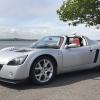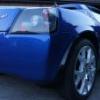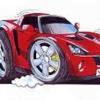
Vw Ea189 Nox Fix (Dieselgate)
#1

Posted 01 June 2017 - 10:06 PM
#2

Posted 01 June 2017 - 10:25 PM
#3

Posted 02 June 2017 - 06:08 AM
#4

Posted 02 June 2017 - 07:36 AM
The fix for Europe is much less severe than the fix required for the US, hence minimal impact (the NEDC is a much milder homologation test than the US 5 tests)
#5

Posted 02 June 2017 - 08:01 AM
Autocar test shows worse economy after Volkswagen diesel fix.
while NOx emissions were almost halved from 0.639g/km pre-fix to 0.351g/km post-fix, our test car’s combined fuel economy had fallen from 50.72mpg to 47.61mpg. This means that its CO2 emissions increased from 147.3g/km to 156.9g/km, a change of 6.5%.
#6

Posted 02 June 2017 - 08:28 AM
#7

Posted 02 June 2017 - 10:02 AM
Autocar test shows worse economy after Volkswagen diesel fix.
while NOx emissions were almost halved from 0.639g/km pre-fix to 0.351g/km post-fix, our test car’s combined fuel economy had fallen from 50.72mpg to 47.61mpg. This means that its CO2 emissions increased from 147.3g/km to 156.9g/km, a change of 6.5%.
Completely junk testing methodology.
- pre flash will be conducted with established long and short term fuel trims
- post flash will be with blank long term fuel trims due to ECU flash
- no back to back testing due to time delay caused by flash.
#8

Posted 02 June 2017 - 10:24 AM
Thanks guys, very informative as ever. Cocopops, am not on Facebook unfortunately, I have the same issue with the letters which clearly don't state the fix is optional, they carry the DVSA logo and the last one i had has a bold red opening paragraph stating there's still time - like its a time limited offer, Bulls**t
I took this up with the DFT yesterday regarding the tone and content of the letters they are aware and looking into it. They have suggested holding off on the fix and if any point do happen to take my car into a dealer for a service they have recommended i get it in writing that they will not install the update before any work is carried out.
#9

Posted 02 June 2017 - 10:25 AM
DFT - (Department For Transport)
#10

Posted 02 June 2017 - 10:53 AM
Autocar test shows worse economy after Volkswagen diesel fix.
while NOx emissions were almost halved from 0.639g/km pre-fix to 0.351g/km post-fix, our test car’s combined fuel economy had fallen from 50.72mpg to 47.61mpg. This means that its CO2 emissions increased from 147.3g/km to 156.9g/km, a change of 6.5%.
Completely junk testing methodology.
- pre flash will be conducted with established long and short term fuel trims
- post flash will be with blank long term fuel trims due to ECU flash
- no back to back testing due to time delay caused by flash.
I'm not disputing it was a crap test, but thinking of it logically, aren't they running EGR much more than before the ECU flash? Isn't EGR putting hot inert gas in the cumbustion cycle at high load? Is there any other possible outcome for economy than it gets worse, which is why VW did it in the first place?
#11

Posted 02 June 2017 - 10:56 AM
#12

Posted 02 June 2017 - 11:40 AM
Autocar test shows worse economy after Volkswagen diesel fix.
while NOx emissions were almost halved from 0.639g/km pre-fix to 0.351g/km post-fix, our test car’s combined fuel economy had fallen from 50.72mpg to 47.61mpg. This means that its CO2 emissions increased from 147.3g/km to 156.9g/km, a change of 6.5%.
Completely junk testing methodology.
- pre flash will be conducted with established long and short term fuel trims
- post flash will be with blank long term fuel trims due to ECU flash
- no back to back testing due to time delay caused by flash.
I'm not disputing it was a crap test, but thinking of it logically, aren't they running EGR much more than before the ECU flash? Isn't EGR putting hot inert gas in the cumbustion cycle at high load? Is there any other possible outcome for economy than it gets worse, which is why VW did it in the first place?
I'm afraid this isn't going to be a simple answer.
The Bosch ECU mode developed to identify and adjust combustion settings on detection of a homologation drive cycle test was first developed to meet US emission targets. These had much more stringent NOx control requirements which acted as a barrier to introduce diesel pass. cars into the USA. In contrast, the single NEDC requirement in Europe combined with more relaxed NOx emissions meant that VW had the hardware to be able to meet requirements, but elected not to (or to do so at reduced levels) to extend out EGR and LNT (Lean NOx Trap) lifespan.
To control tailpipe NOx, there are a variety of options:
- EGR dilutes fresh air with exhaust gasses to prevent combustion peak temperatures that cause of oxidation of air borne nitrogen into nitrogen oxides. Downside is poorer combustion, fuel economy and limited points where EGR can be applied (usually part throttle)
- LNT captures NOx in a catalytic cell and requires a rich running mode to reduce the NOx back into nitrogen, burning more fuel. Downside is poor fuel economy due to rich running regeneration, and durability of the LNT under multiple regeneration cycles (the LNT substrate can melt)
- SCR uses a urea injection to reduce NOx in the gaseous phase in the tailpipe. Downside is the cost of the system and cosmetic impact to customers required to top up SCR fluid.
With that covered. There have been a number of EA189 generations, the first two generations used EGR and LNT to control NOx, while the last generation used SCR. For the LNT equipped vehicles, LNT regen will occur more frequently which will impact fuel economy and LNT durability (I suspect they were undersized as cheat was known to protect the LNT), EGR rates will change but not substantially because EGR only works within a limited rpm and load range. It will also be designed to close during LNT regeneration, but that will expose the EGR valve to significant heat and potentially be causing the described failures.
For SCR models, SCR dosage and frequency will increase, this will not affect engine performance but will require more frequent SCR top ups.
So to answer your question. VW didn't need to cheat in Europe, but did so to protect sensitive components and allow cost saving on these components, mostly LNT sizing and SCR dosing, but also the number of heat cycles the EGR is exposed to.
EGR itself isn't really a significant impact on fuel economy as it has limited points where it operates.
#13

Posted 02 June 2017 - 01:54 PM
Thanks for the detailed explanation.
I must say while NOX is an horrible gas and I'm fully in favour of reducing NOX emissions, EGR is the most loathsome technology. I have no problem with putting urea in the car, but I don't want to put diesel soot in my induction manifold.
#14

Posted 03 June 2017 - 08:39 AM
Thanks for the detailed explanation.
I must say while NOX is an horrible gas and I'm fully in favour of reducing NOX emissions, EGR is the most loathsome technology. I have no problem with putting urea in the car, but I don't want to put diesel soot in my induction manifold.
A lot of modern engines use low pressure EGR which recirculates gasses collected downstream of the turbocharger and DPF, this means you're putting 'clean' exhaust gasses into your inlet instead. However this does impact transient response and can't be used for warm up.
#15

Posted 03 June 2017 - 06:58 PM
My daily is one of the affected - which facebook group are you alluding to?
I've received two letters but am currently not following up on the fix as I'm remapped anyway ![]()
Edited by Raptor, 03 June 2017 - 06:58 PM.
#17

Posted 03 June 2017 - 07:27 PM
![]()
#18

Posted 03 June 2017 - 07:43 PM
I have spoken to quite a few that have had it done and all have complained of issues as per the Facebook page.
Yesterday we had a customer in who specifically told the dealer not to to do the update when his a car was in for a service and when he collected the car it had been done. He absoltley fuming as the car is now sluggish and the mpg has dropped. He has asked them to revert the car back to how it was but has been told that they can't.
#19

Posted 03 June 2017 - 07:53 PM
#20

Posted 03 June 2017 - 08:27 PM
1 user(s) are reading this topic
0 members, 1 guests, 0 anonymous users


















